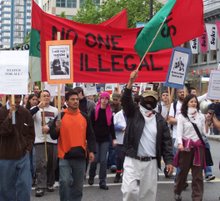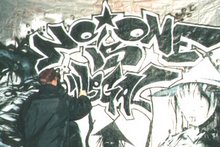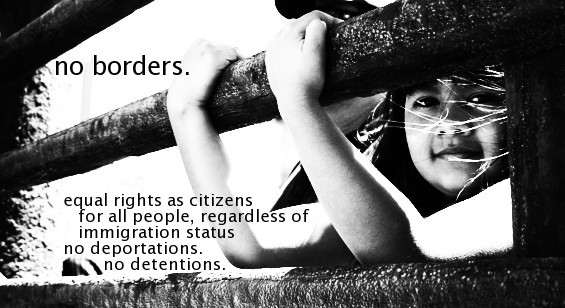Choices for Black labor by Bill Fletcher; Black Commentator; June 23, 2007
I came of age politically in the middle of the Black Power movement. Within the ranks of organized labor, both the Black Power movement and the Anti-Vietnam War movement had a significant impact through the mid1970s. Caucuses were being formed to challenge the bureaucratic leaderships of many unions. Wild-cat strikes were taking place in workplaces around the country. And in some locales, independent unions were being established where workers had concluded that the established union movement was incapable of making any significant changes to address the needs and demands of rank and file workers. At the national level, the Coalition of Black Trade Unionists emerged as a major voice arguing that organized labor needed to take a new and different look at the Black worker, a look and engagement that was based on the need for respect and equality.
As we enter the 21st century, Black labor is in disarray. Within the ranks of organized labor, the various institutions that have often spoken on its behalf have ossified. Black caucuses in various unions have stepped back from challenging and pushing the union leaderships and instead have in all too many cases degenerated into social clubs or step-ladders for individuals to get positions in the union structure. While there are greater numbers of Black staff and, in some cases, elected leaders, there is an emphasis on acceptability—to the leadership of organized labor—within the ranks of the movement, rather than an emphasis on challenge and struggle.
(Click here to read more)
skip to main |
skip to sidebar







Vancouver - Occupied Coast Salish Territories noii-van@resist.ca / 604-682-3269 ext.7149 www.nooneisillegal.org

Blog Archive
-
▼
2007
(422)
-
▼
June
(17)
- Blockades up as aboriginal day of action begins
- Threats and Opportunities by Noam Chomsky
- Why Boycott Israel? Because It’s Good for You
- Black Americans on opposite sides of immigration d...
- Displacement in Palestine: Everything is Possible
- The Life and Death of a Border Town
- The Crisis in Gaza: Made in Israel, Not a Civil War
- Choices for Black labor
- India Will Have 400 million Agricultural Refugees
- Iraq government orders arrest of oil workers' leaders
- Canada: 40% percent of military contracts are “non...
- “Two States Or One State” By Uri Avnery & Ilan Pappe
- SPP: NAFTA Kicked Up A Notch
- G8 NEWS: Information on the Migration Day of Action
- Baghdad Burns, Calgary Booms by Naomi Klein
- Shut Down of Immigration Detention Center in Houston
- Canada in Afghanistan
-
▼
June
(17)
Labels
- Afghanistan (21)
- Africa (25)
- Anti-Oppression (15)
- Australia (8)
- Canada (105)
- Corporate Globalization (45)
- East Asia (9)
- Environment and Health (26)
- Europe (25)
- Gender (42)
- GLBTQ (7)
- Haiti (9)
- Immigrant/Refugee/Nonstatus (154)
- Imperialism (51)
- Incarceration (63)
- Indigenous (57)
- Iraq (54)
- Labour (34)
- Latin America (41)
- Media (3)
- Middle East (28)
- Palestine (42)
- Police Brutality (4)
- Poverty (17)
- Racism (58)
- Security (67)
- Somalia (7)
- South Asia (25)
- SPP (2)
- US Abroad (91)
- US Home (160)

About Us
No One is Illegal-Vancouver is a grassroots anti-colonial immigrant/refugee rights community collective with leadership from members of migrant and/or racialized backgrounds.
As a movement for self-determination that challenges the ideology of immigration controls, we are in full confrontation with Canadian border policies; denouncing and taking action to combat racial profiling, detention and deportation, the national security apparatus, law enforcement brutality, and exploitative working conditions of migrants. We stand in solidarity with indigenous struggles against colonization across Turtle Island and also place ourselves within the broader movement for global justice struggling against capitalism, homophobia, occupation, patriarchy, poverty, war, and other systems of oppression and exploitation.





No One Is Illegal - Vancouver
Our educational work involves furthering an anti-imperialist, anti-war, and anticapitalist analysis that links the "War on Terror" abroad to the racist "Fortress North America" at home. We struggle for the right for our communities to maintain their livelihoods and resist war, occupation, and displacement, while building alliances and supporting indigenous sisters and brothers fighting theft of land and displacement.
Our work is carried out through various strategies including public awareness events, direct support work with refugees and undocumented migrants, multilingual community political/legal forums, fighting back through rallies and direct actions, and ongoing campaigns and projects.